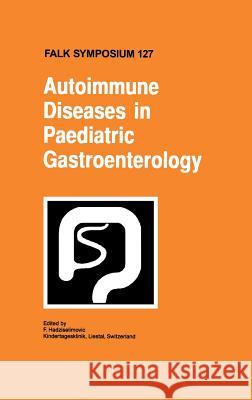Autoimmune Diseases in Pediatric Gastroenterology » książka
Autoimmune Diseases in Pediatric Gastroenterology
ISBN-13: 9780792387787 / Angielski / Twarda / 2002 / 262 str.
This book is the proceedings of the Falk Symposium No. 127 on Autoimmune Diseases in Paediatric Gastroenterology' (IV International Falk Symposium on Paediatric Gastroenterology), held in Basel, Switzerland, on November 8-9, 2001. The symposium focused on the role of the immune system, both the acquired and the innate systems, in inflammatory bowel disease (IBD) in children and adolescents. The innate system has an important fundamental role in host defence by initiating immune responses against potentially deleterious matter. However, a mutation within the innate system may elicit an immune response against the host: hence, an autoimmune response. Chronic autoimmune hepatitis occurs predominantly in young people, and especially in women. Immunological changes are conspicuous. Tissue antibodies are found in a large number of patients. This is a disease of disordered immunoregulation marked by a deficit in suppressor T cells causing the production of autoantibodies against specific hepatocyte surface antigen. Liver membrane protein is found in the sera of patients with autoimmune chronic acute hepatitis and with primary biliary cirrhosis (PBC). The latter condition of progressive granulomatous destruction of intrahepatic bile ducts is, in many respects, analogous to the graft-versus-host syndrome where the immune system has become sensitized to foreign HLA-molecules. Primary sclerosing cholangitis (PSC) is another condition of unknown origin. All parts of the biliary tree can be involved in a chronic, fibrosing, inflammatory process that results in obliteration of the biliary tree and ultimately in biliary cirrhosis. About half of the patients also suffer from ulcerative colitis and rarely from Crohn's disease. Circulating antibodies to some antigens are found in obstructed portal tracts, as well as increased concentrations of biliary immune complexes in patients with PBC.
In all three previous Falk symposia on paediatric gastroenterology, attention was focused on the role of the innate immune system in the aetiology of IBD. It has become increasingly clear in recent years that the innate system has a much more important and fundamental role in host defence. The decision to initiate an immune response is one of the major roles of the innate system. Mutations within this system could transform it into becoming constitutively active, resulting in an inflammatory reaction and thus eliciting an autoimmune response. Following an introduction to the basic phenomena of autoimmunity, the proceedings discuss clinical aspects of autoimmune diseases. In particular, current knowledge and the state of the art about the diagnosis and treatment of the autoimmune diseases of the gastrointestinal tract are described by world-renowned experts. The book also contains the short presentations on selected topics, as well as abstracts of the mini-posters read by title, which were included in the symposium.











